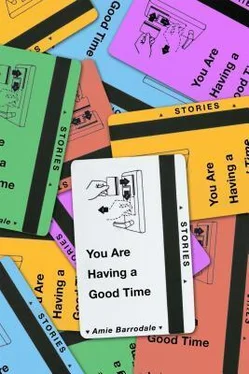“Sir, you see, we have been working many hours.”
“The shirts are fine,” I said. “I don’t want the suit.”
Mr. Butt winced.
“Please, sir.” Salama held out the white suit. “I have made it you. Please try.”
The young woman looked into my eyes. “You have ordered this suit, and my father has made it you.” She was trying to bully me, but her heart wasn’t in it.
I took the suit from Mr. Salama. One of Butt’s sons took me to a bedroom where I could change. I noticed a plate tipped against an old-fashioned, high-end hi-fi. He saw me looking and took a long time explaining where it had come from. For him the plate had magic.
The suit was the kind I had often seen on other men. It fit me. It drew me together. I felt different inside it. Young. I wanted to stay alone in the room, in the suit, but I would have to come out.
Servants brought a cloth, bowls, rice, several dishes. Silverware and china were brought for me. Salama and his daughter sat cross-legged and ate off silver plates, using their hands. Mr. Butt ate out of a silver trophy. He sat on his knees, with his shoulders stooped. He stared at the floor and put one and then another fistful of food into his mouth.
After we had eaten, Mr. Salama said, “Now, if it is all right, you could walk for us.”
I walked around Mr. Butt’s living room, back and forth in front of the cot and his wife, Salama and his daughter, until they were satisfied. Then I sat cross-legged in my exquisite suit, and we drank tea. This is the way it is for me. This is the way it is for the people I love. My dad had a plastic basin in his closet full of $600 shoes, but he wore Tiddies — those rubber-soled flip-flops — and had his hair cut at a gay men’s salon. We are people who never get it right.
Frank Advice for Fat Women
A woman who was lonely and depressed should begin by getting on some medication. She should clean her house and throw away clutter. After that, Dr. Sheppard told his patients to lose weight and wear dresses.
He and his wife had shared a practice for twenty years, and so they had — after some initial attempts to carry on as usual — made a short-term arrangement: he saw his patients in the mornings, and Isabel saw hers in the afternoons. She would not speak to him. Together they had agreed on a clean break.
His new academic appointment filled the downtime. He kept to his schedule. He meditated in the mornings, jogged three afternoons a week. When he noticed an uptick in his night eating, he hired a nutritionist. He was eating better than he had in years.
Then Catherine Summer called. His secretary told him that Mrs. Summer had been referred by Columbia’s dean and wanted to see him, or something. “She has anxiety.” When Dr. Sheppard finally spoke with Mrs. Summer on the telephone, she explained that her daughter had suffered a panic attack at Morts Restaurant in St. Louis.
“Debbie’s been in New York five years. She hasn’t done anything. She interned at Town & Country and she volunteered at the Morgan, but from what I can gather, all she does is eat and drink. We pay her expenses — we always have — but of course that is with the expectation that eventually she will find her way. Now it seems like she’s developing these disorders.”
“I’m sorry to say I’ve recently accepted a position at Columbia University, in addition to my private practice, so as you can imagine—”
“How nice. Debbie’s almost twenty-eight years old, and she has no plans for a career, no boyfriend. Dr. Angel said you were the right one for us.”
“Oh, you know Don? That’s interesting, Mrs. Summer. You’ll have to tell him I said hello.”
“Debbie didn’t use to have a weight problem, or any problem, but her last boyfriend was overweight, and some of his eating habits rubbed off on her. Over Christmas she’d sit in front of the television with a sleeve of crackers and a block of cheese, and I’d say, ‘Go out! Do something!’ I know she could lose the weight easily, if she’d simply do something, but she won’t listen to my suggestions, and I’m worried, with her father’s metabolism, if she lets herself reach thirty without losing the weight, it’ll just stay on her. After a certain age, a woman’s body just won’t respond to diet or exercise — our estrogen levels change — and of course there are procedures, but why go down that road? She’s just a girl! Of course I’m happy to pay for liposuction if she’ll take it, but I tell her it’s simple: don’t eat. All the diet gurus in the world are peddling the same line of bullshit, excuse me, but if you want to lose weight, stop eating.”
Dr. Sheppard looked at the nineteenth-century Satsuma vase on the corner of his desk. It was one of two, about the size of a lamp, and had been commissioned for a Russian general, to resemble a lighthouse. It had been a gift from Isabel’s mother to the couple when they married.
“Hello? Dr. Sheppard? The sooner the better, honestly. We need your help. I’m asking as a mother.”
“Yes, sorry, I’m here.” He asked if Debbie would be free to meet at lunchtime.
“Of course — she doesn’t have a job. I believe I mentioned that.”
He began to take notes.
* * *
Debbie threw herself into the armchair opposite his desk. His first impression was that she was remarkably pretty. Her hair was almost blond, and it was long and straight. She dressed mannishly — in jeans, a wool crewneck sweater, a worn-out blue oxford shirt, and high-quality, unpolished loafers — but she couldn’t hide her looks. Her diamond earrings caught his eye throughout the conversation.
Debbie was slightly overweight, and her posture was bad, but her manners were good. She looked Dr. Sheppard directly in the eye when she said, “Thank you for meeting me. My mother told me you made an exception for her. She’s very happy that I’m here.”
“How do you feel about it?”
“I’m doing my best to humor everybody.”
“What do you mean?”
“I mean my mom wants me here, and so fuck it. No offense.”
Dr. Sheppard nodded. He glanced over the intake questionnaire. No health problems, no smoking, no problems with alcohol. Asked to list her number of drinks, Debbie checked the box “four — five a night.” So, a problem with alcohol. She didn’t exercise. She slept between ten and twelve hours nightly. In answer to the question “Why did you come in today?” she wrote, “I’d like to find a solution to life’s mysteries.”
“What about, do you have anxiety? Your mother mentioned something at Morts.”
Debbie pressed her face into her hands and took a deep breath. “I had a panic attach, okay? I think they’re pretty normal. My mom acts like I have a gnome or something.”
“A what?”
“Ugh, a movie I saw. This schizo guy had a gnome that made him drink rye.”
Dr. Sheppard didn’t press her, but he made a note. Of course she had intended to say panic attack, but the word she spoke was “attach.” He prescribed a low daily dose of Prozac, Ativan as needed for mild anxiety, and a monthly supply of ten four-milligram Xanax for severe panic. He asked Debbie to come back two days later, on Thursday, and to see him twice weekly until they were comfortable with each other. As she was leaving with the papers, he said, “Do you feel all right about that? How do you feel?”
“Compromised,” Debbie said. “See you Thursday.”
* * *
He was in his school office eating a Potbelly sandwich later that afternoon — he taught Tuesdays from 4:30 to 6:20—when Mrs. Summer called and asked if he had a moment to chat.
“Well, to be honest, Mrs. Summer, I teach in a few minutes.”
Читать дальше












